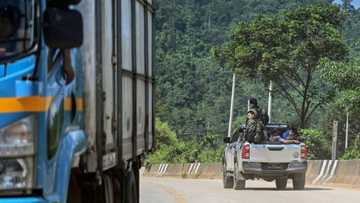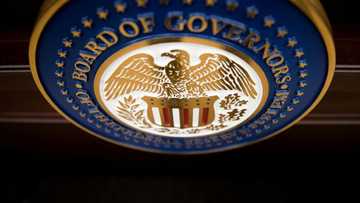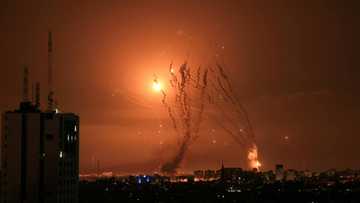Pre-election jitters send Argentine peso to new lows

Source: AFP
PAY ATTENTION: Unlock the best of Legit.ng on Pinterest! Subscribe now and get your daily inspiration!
The US dollar broke through the symbolic 1,000 peso mark on Argentina's parallel market on Tuesday, as citizens scramble to dump the currency two weeks before a presidential election, according to websites tracking the rate.
Argentines are heading to the vote with annual inflation at over 120 percent and record poverty levels, as the South American nation grapples with how to emerge from decades of economic malaise.
The dollar has long been a safe haven from the peso, with people buying the currency whenever they can as a form of savings and protection from their currency's volatility.
However, with strict restrictions on access to dollars, the "blue dollar" -- a thriving black market exchange tool -- is how most get their hands on the greenback.
With the parallel dollar now trading at over 1,000 pesos, it is worth almost three times the official rate of 365 pesos, propped up at great cost by the government.
Uncertainty is high ahead of the vote, and frontrunner Javier Milei, a radical outsider who has vowed to dollarize the economy, on Monday urged people to steer away from investments in pesos.
PAY ATTENTION: Share your outstanding story with our editors! Please reach us through info@corp.legit.ng!
"Never in pesos, never in pesos. The peso ... isn't worth excrement," Milei told a local radio station just days after saying that a higher dollar rate would make it easier to dollarize the economy.
Since 2015, Argentina has imposed strict restrictions on the purchase of foreign currency, as the Central Bank's reserves plummeted. Analysts say the reserves are currently in the red.
The Central Bank issued a statement on Monday saying "the Argentine financial system presents a solid situation of solvency, capitalization, liquidity and provisioning."
'Irresponsible'
Weary Argentines, young and old, rich and poor, have flocked behind Milei and his extreme ideas spread on television and social media, as their only hope out of the country's seemingly endless economic quagmire.
He has vowed to take a chainsaw to the bloated state, heavy on welfare and subsidies, and "dynamite" the central bank.
Economists say his plans to dollarize the economy are not feasible, notably because the country is so short on dollars.
His main rivals in the October 22 vote will be former security minister Patricia Bullrich on the right, and Economy Minister Sergio Massa from the ruling center-left coalition.
Massa slammed Milei's comments as "irresponsible."
"Agitating, telling people to withdraw their deposits irresponsibly... when I see candidates capable of setting the house on fire, it worries me," Massa said, accusing Milei of "playing with people’s savings."
Massa has also been accused of worsening Argentina's crisis by going on a spending spree to woo voters.
In recent weeks he has eliminated income tax for some 800,000 citizens, removed VAT levies from basic goods, and is making cash payouts to millions of informal workers.
Argentines remain haunted by the country's economic implosion in 2001, and deeply distrustful of their own banks and currency.
That year, amid a growing economic crisis, authorities froze bank deposits to avert a flight of capital and a run on the dollar.
Protests and looting broke out, the president fled by helicopter, and within days the country defaulted on $100 billion in debt. Almost 40 people died in a crackdown on protests.
Since then, Argentina has battled with boom and bust cycles, inflation, currency devaluations, and debt restructuring.
Source: AFP




